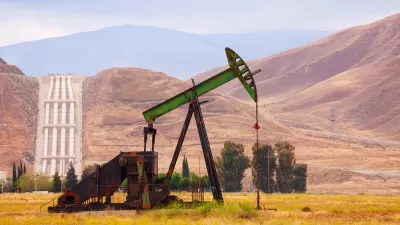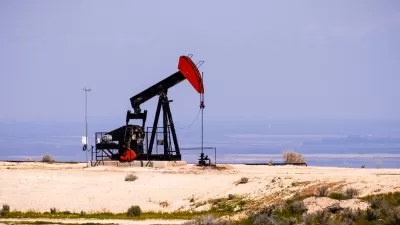Hydraulic fracturing may finally allow drillers to extricate oil from the Monterey Shale, creating a shale oil boom that could dwarf ones in states such as North Dakota. Environmentalists are digging in to limit the controversial practice.
Norimitsu Onishi reports on what is becoming the next front in the battle over the controversial oil extraction process known as fracking. With two-thirds of the United States’s total estimated shale oil reserves stored in its "complex geological formation," the stakes over efforts to tap California's Monterey Shale couldn't be higher. As Onishi notes, "covering 1,750 square miles from Southern to Central California, the Monterey Shale could turn California into the nation’s top oil-producing state and yield the kind of riches that far smaller shale oil deposits have showered on North Dakota and Texas."
"Established companies are expanding into the Monterey Shale, while newcomers are opening offices in Bakersfield, the capital of California’s oil industry, about 40 miles east of here. With oil prices remaining high, landmen are buying up leases on federal land, sometimes bidding more than a thousand dollars an acre in auctions that used to fetch the minimum of $2."
"The Monterey Shale has also galvanized California’s powerful environmental groups. They are pressing the state to strictly regulate hydraulic fracturing, or fracking, the drilling technique that has fueled the shale oil and gas boom elsewhere but has drawn opposition from many environmentalists. In December, the State Department of Conservation released a draft of fracking rules, the first step in a yearlong process to establish regulations."
“If and when the oil companies figure out how to exploit that shale oil, California could be transformed almost overnight,” said Kassie Siegel, a lawyer at the Center for Biological Diversity. “Fracking poisons the air we breathe and the water we drink. It is one of the most, if not the most, important environmental issue in California.”
FULL STORY: Vast Oil Reserve May Now Be Within Reach, and Battle Heats Up

Alabama: Trump Terminates Settlements for Black Communities Harmed By Raw Sewage
Trump deemed the landmark civil rights agreement “illegal DEI and environmental justice policy.”

Study: Maui’s Plan to Convert Vacation Rentals to Long-Term Housing Could Cause Nearly $1 Billion Economic Loss
The plan would reduce visitor accommodation by 25% resulting in 1,900 jobs lost.

Planetizen Federal Action Tracker
A weekly monitor of how Trump’s orders and actions are impacting planners and planning in America.

Wind Energy on the Rise Despite Federal Policy Reversal
The Trump administration is revoking federal support for renewable energy, but demand for new projects continues unabated.

Passengers Flock to Caltrain After Electrification
The new electric trains are running faster and more reliably, leading to strong ridership growth on the Bay Area rail system.

Texas Churches Rally Behind ‘Yes in God’s Back Yard’ Legislation
Religious leaders want the state to reduce zoning regulations to streamline leasing church-owned land to housing developers.
Urban Design for Planners 1: Software Tools
This six-course series explores essential urban design concepts using open source software and equips planners with the tools they need to participate fully in the urban design process.
Planning for Universal Design
Learn the tools for implementing Universal Design in planning regulations.
Caltrans
Smith Gee Studio
Institute for Housing and Urban Development Studies (IHS)
City of Grandview
Harvard GSD Executive Education
Toledo-Lucas County Plan Commissions
Salt Lake City
NYU Wagner Graduate School of Public Service




























